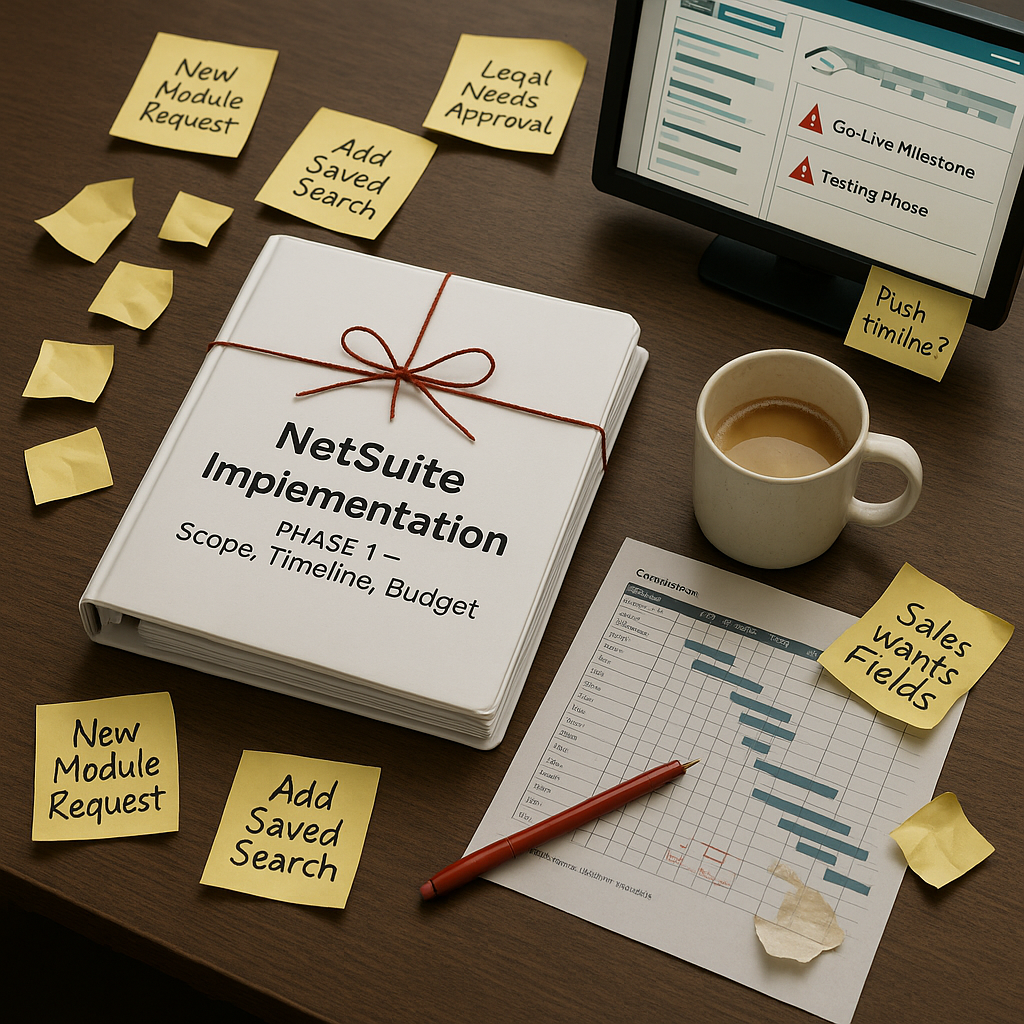Is Scope Creep Putting Your NetSuite Implementation at Risk?
Implementing NetSuite ERP isn’t just a software upgrade. It’s a high-stakes, enterprise-wide transformation. If you’re a CFO, IT leader, or project...
7 min read
Ritch Haselden : Updated on October 4, 2025

CIOs and CFOs face a pivotal decision when it comes to ERP performance. According to Gartner, over 70% of ERP implementations fail to deliver expected benefits, and 25% of those fail catastrophically. That’s not just a number; it’s a risk to timelines, budgets, and strategic outcomes.
With NetSuite as your enterprise backbone, your choice of support model matters deeply. Will standard NetSuite support suffice to maintain stability? Or do you need a NetSuite consultant who brings both functional and technical expertise, with a tailored strategy to elevate outcomes?
This article addresses your deepest concerns, such as ROI, operational resilience, and scalability. We’ll contrast vendor support with specialized consulting so you can determine which approach delivers the enduring results your business demands.
NetSuite is a powerful ERP system, but its effectiveness depends on proper implementation, configuration, and continuous improvement. Oracle support helps manage your NetSuite license, resolve system issues, and maintain uptime. It's built to stabilize the platform—not improve how your business operates.
A NetSuite consultant, on the other hand, brings functional and technical expertise to align the system with your business needs. These professionals help implement workflows, optimize modules, and automate processes to support long-term goals.
Support maintains the system. Consulting transforms it. For companies facing complexity, growth, or performance gaps, a qualified consultant is often the smarter path to results.
NetSuite’s built-in support provides essential system coverage. It’s designed to stabilize the platform, not enhance it—making it a fit for standard issues, but a limitation for companies pursuing long-term ERP optimization:
Support handles software bugs, permission issues, and configuration errors within default modules like financials and inventory. Assistance is ticket-based, and most responses follow a knowledge base template. There is no hands-on help for scripting, data modeling, or advanced system logic.
It’s sufficient for minor disruptions. But not for companies aiming to optimize workflows, streamline operations, or build competitive advantage through ERP.
Support is governed by SLA tiers. Response times vary from two hours to more than a day, depending on urgency and plan. High-priority tickets may still face delays. There is no case continuity across agents, and support is limited to system-defined functions.
Tasks like module reconfiguration or integration fixes fall outside standard post-go-live support. There’s also no ability to proactively manage performance, advise stakeholders, or support analytics improvements.
Oracle’s Advanced Customer Support (ACS) offers increased responsiveness and light-touch monitoring, but its scope remains narrow. ACS won’t troubleshoot SuiteScript, redesign workflows, or guide strategic enhancements. For most businesses with growing complexity, ACS alone isn’t enough.
Support has a role—especially for small businesses, early-stage deployments, or teams without dedicated ERP staff. It offers reliable access to Oracle engineers and official documentation, and keeps the lights on. But for any company seeking scalability, post-implementation optimization, or system agility, support alone will fall short.
NetSuite consultants bring both strategic value and deep execution capability—far beyond what vendor support can offer. But they also come with considerations that must be factored into the decision:
Consultants lead implementations, configure modules, and streamline workflows around real business needs. With both technical and functional expertise, they automate tasks, optimize processes, and help build a scalable ERP foundation.
They align the system to your operational model, not the other way around—delivering faster time-to-value through hands-on guidance and industry-specific experience.
Whether it’s scripting with JavaScript, improving post-go-live performance, or rethinking how you handle analytics, a consultant owns outcomes. For end-to-end support, DiamondCare's NetSuite Implementation Services offer a structured methodology built for scalability, speed, and measurable results.
A top-tier NetSuite consultant doesn’t just configure software. They architect outcomes. Beyond implementation, consultants help reduce friction, improve adoption, and align NetSuite with both operational metrics and strategic goals. The right partner brings measurable value across every stage of your ERP journey:
Not all consultants offer the same value. With rates between $125 and $275 per hour, smaller businesses may struggle to justify the cost for short-term needs. You’ll also need to vet their track record, availability, and ability to handle both technical aspects of the system and broader business process alignment.
The best-fit consultants function as strategic partners—not just implementers—so choosing the right one is essential to avoiding budget bloat or missed expectations.
When evaluating how to manage your NetSuite ERP, the choice between standard vendor support and hiring a NetSuite consultant depends on several operational factors. From availability to long-term ROI, the differences are significant—and directly impact business continuity, scalability, and user adoption.
Oracle support follows SLA tiers that define minimum response times, not resolution. In critical cases, even top-tier ACS users can face delays due to internal queueing. Consultants under retainers often respond faster and with deeper system context. This is particularly valuable during go-live, major ERP projects, or recovery scenarios with a high risk of downtime.
Support agents are trained generalists who can answer platform-related questions. However, they do not manage integrations, cross-module issues, or post-implementation complexity. In contrast, a seasoned NetSuite implementation consultant brings functional and technical depth, including custom scripting, advanced reporting, and architecture design. They troubleshoot based on system behavior—not documentation alone.
Support won’t build out new workflows or adapt your ERP to specific use cases. There’s no roadmap planning or user training beyond predefined help resources. Instead, consultants can design solutions around specific business requirements. They implement NetSuite in ways that reflect your operational model—through custom roles, KPIs, SuiteScript automation, and tailored interfaces.
Oracle support is bundled with your NetSuite license or offered as a premium through ACS. It’s predictable, but limited in scope. Consultants charge based on scope, duration, or retainers. While costs are higher upfront, the long-term ROI is often stronger—especially for businesses managing evolving needs or aiming for a successful NetSuite implementation.
Support resolves symptoms. Consultants solve root issues. With a functional consultant, you gain a partner who can align NetSuite with your company’s KPIs, compliance needs, and growth trajectory. They help you build a NetSuite solution that supports not just today’s workflows, but the business you’re becoming.
| Comparison Area | NetSuite Support | NetSuite Consultant |
|---|---|---|
| Response Time | SLA-based, delays possible | Faster, contextual responses under retainer |
| Expertise | Platform generalists | Deep functional and technical ERP expertise |
| Customization | Not included | Full workflow, module, and role-specific customization |
| Cost | Bundled with license or ACS upgrade | Project-based or retainer; higher upfront, better ROI |
| Strategic Value | Fixes issues on demand | Drives optimization, scalability, and user adoption |
| Best Fit For | Standard usage, minimal internal complexity | Growth-stage companies with specific requirements |
Choosing between vendor support and a NetSuite consultant isn’t about which is better in theory—it’s about what your business needs in practice. The right choice depends on your stage of growth, internal capabilities, and the complexity of your ERP environment. Here’s how to evaluate fit, backed by real-world examples.
For startups or small businesses with basic processes, standard Oracle support may be sufficient. If your focus is on core modules like financials or inventory, and you’re not yet customizing workflows, ticket-based support can help you manage NetSuite without unnecessary overhead. There’s minimal need for scripting, integration, or architectural redesign in these cases.
As workflows multiply and reporting demands increase, vendor support struggles to keep pace. Businesses entering new markets, expanding product lines, or facing regulatory complexity often need a NetSuite functional consultant to reconfigure dashboards, align modules with KPIs, and streamline post-implementation workflows. Consulting is often the only way to ensure the ERP evolves with the business.
Some projects demand deep intervention. Whether you're migrating from legacy systems, consolidating subsidiaries, or facing a failed NetSuite implementation, a consultant becomes essential. These situations require technical knowledge, stakeholder alignment, and rapid stabilization. DiamondCare's ERP Rescue Plan was built for exactly this use case.
Case 1: Inventory Management Issue
A manufacturing firm struggled with inaccurate bin transfers. Support provided documentation, but couldn’t resolve the logic flaw. A consultant rewrote the allocation rules and implemented a custom script to fix the demand planning sequence.
Case 2: Custom Dashboard Implementation
A SaaS company needed department-specific dashboards for executives. Support declined the request. A consultant created KPI scorecards, embedded saved searches, and aligned the views with board reporting metrics.
Case 3: SuiteScript Automation Challenge
An eCommerce team wanted to automate SKU bundling at checkout. Oracle support didn’t handle scripting. A NetSuite technical consultant built a custom SuiteScript with rollback logic and error handling to automate the entire process.
Choosing the right NetSuite support model comes down to clarity—on your goals, complexity, and internal bandwidth. Whether you're relying on vendor support or engaging consulting services, the partner you choose will shape the outcome of your ERP investment.
Are you trying to accelerate month-end close, automate key workflows, or improve forecasting accuracy? Your answer determines the kind of partner you need. Consultants should not just troubleshoot; they should help you hit performance benchmarks. Look for those with proven case studies, not just feature lists.
Minimal customization? Support might work. But if you're configuring custom records, scripts, or multi-entity structures, you'll need a NetSuite functional consultant or technical consultant who understands both your system and your sector.
High complexity demands expert guidance and a partner who can reduce risk, not just offer support. If you’ve already encountered setbacks, review these common causes behind failed NetSuite implementations to benchmark your current risks.
If speed matters, during a rollout, rescue, or reimplementation, consultants are worth the investment. If cost is the priority and your team can manage minor issues in-house, support may be enough. Choose based on total business impact, not just invoice size.
Vendor support ends at the ticket. Consultants can grow with you. The best partners offer post-go-live support, process tuning, and roadmap planning tied to your evolving needs. For example, DiamondCare supports clients well beyond implementation, with ongoing optimization, scripting support, and strategic guidance to keep NetSuite aligned as the business scales.
NetSuite support is reliable for maintaining stability, especially in straightforward environments with limited customization. It works best for early-stage businesses or those with strong in-house teams capable of managing minor system issues.
But for companies facing growth, complexity, or underperforming ERP investments, a NetSuite consultant brings the flexibility and expertise required to move the system from functional to strategic. The key is choosing the right partner based on your roadmap, internal capacity, and long-term goals.
Book a free 30-minute consultation with a DiamondCare NetSuite specialist to explore the best-fit support model for your business.

Implementing NetSuite ERP isn’t just a software upgrade. It’s a high-stakes, enterprise-wide transformation. If you’re a CFO, IT leader, or project...

You’ve invested heavily in NetSuite. But is it delivering what your team actually needs?

5 min read
Most NetSuite implementations don’t fail because of technical issues. They fail because users never adopt the system. According to Gartner, by 2027